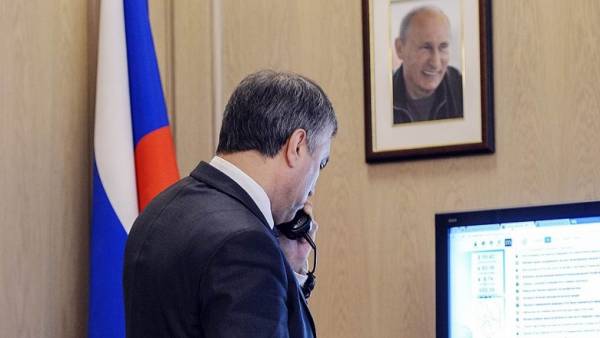In the contracti found a threat to the authority of Russia
Duma energy Committee criticized the draft bill.

Implementation of the draft law on the response to the “unfriendly actions of the United States” may cause to the reputation of Russia “serious damage”, and Russian companies working in the field of nuclear energy, “significant financial loss”, according to the conclusion of the Duma Committee on energy. The co-sponsor, speaker of the state Duma Vyacheslav Volodin, most likely, have agreed with the Kremlin “on a more restrained response to American sanctions,” experts say.
The bill on the counter, entered April 13, Mr. Volodin and the leaders of four Duma factions (later it was signed by more than 360 MPs and several senators), involves the “termination or suspension of international cooperation” Russia in the nuclear industry with the United States and other foreign States and entities under their jurisdiction (clause 4, article 2).
In the case of implementation of this provision noted in the conclusion of the Duma Committee on energy, will be “complicated conditions for further work” Russia on the world market, and business reputation of the country may be caused “serious damage”, and Russian companies are threatened with “significant financial loss”.
There is “the risk of a General decline of the image and prestige of Russia in the international arena,” the fear in the Committee. So, Russia participates in international projects of ITER (international thermonuclear experimental reactor) and fair (European research centre of ions and antiprotons), but the adoption of the document can lead to “RF output from these projects”, and the investments already made “non-refundable”.
Russian organization “will lose the contract to develop and manufacture high-tech products”, and in General, Russia could lose the leadership role “in the field of controlled thermonuclear fusion”.
Under threat and the project on creation of the multipurpose fast reactor (MBIR), noted in Committee: the law may block the participation of foreign partners in this project that “will increase the burden on the Federal budget” and the resulting “call into question the possibility of further implementation” of the project. And termination of INPRO (international project on nuclear fuel cycles) “threatens the loss of Russia’s access to advanced technologies of the leading countries in the field of nuclear energy” and the termination “of the training of young Russian scientists.” The Committee also notes the risks in the supply of natural uranium and enrichment services, as well as risks “for foreign projects on construction of NPP” (we are talking about the projects of NPP “Hanhikivi” in Finland and Paks NPP in Hungary). “The probability of replacement of Rosatom state Corporation for alternative suppliers from the USA, China, Korea or Japan,” warn the Committee and recommended to consider the comments when finalizing the draft for the second reading.
That the provisions of the project need in relation to other Federal laws governing “similar relations”, previously reported in its findings the legal Department of the Duma Committee on international Affairs. It is including the law “On special economic measures”, under which Russian President Vladimir Putin in 2014 has signed a decree banning the import into Russia of food from a number of countries. Also the authors of the project, it was recommended to clarify the terms used in the project and “further discuss” the feasibility of banning or restricting the import into Russia of foreign drugs. The first reading is scheduled for may 15, Vyacheslav Volodin stated that with the adoption of the law in the second and third readings to “not procrastinate.”
Political analyst Yevgeny Minchenko says that the project “was an emotional reaction that was more media than a real character.”
Needed a quick response from a body that does not accept the final decision, and in this sense, the initiative played a role.Eugene Minenapolis
The document will be adjusted, he said. “Volodin sufficiently in control of the Deputy corps to be able to assume that the opinions of the committees was not agreed with him, — the analyst believes Abbas Gallyamov.— Most likely, the speaker was able to negotiate with the Kremlin on a more restrained reaction to the U.S. sanctions than anticipated at first.” The expert believes that “everything will be the same scenario as the story of the renovation: first introduced a radical version, and then in discussion with stakeholders it is much softened. The public this creates the impression that her hearing.”
The Director of the Institute of strategic analysis FBK Igor Nikolaev believes that the deputies were in a difficult position: “They in any case have in some form to this law, hence their assured approval on first reading. But none of them wants to be responsible for the consequences of the law, hence the criticism.” In addition, members are actually “suggested to other countries, what sanctions from Russia are possible in the future,” said Mr. Nikolaev: “the Americans could not think that someone, for example, will not put Titan”. And now foreign companies will prepare for potential sanctions, even “if they will not be in the final version of parliamentary law.”
Natalia Kurchenkova, Katherine Grobman, Victor Khamrayev